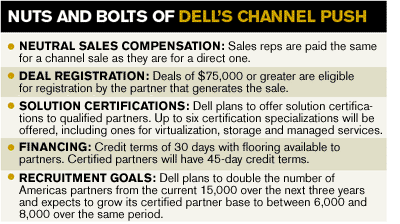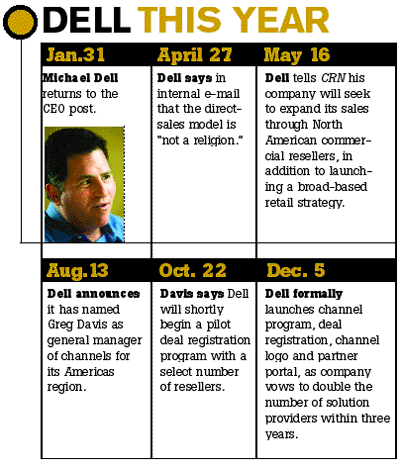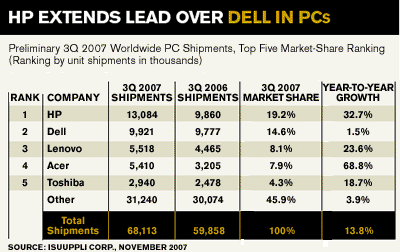Can The Channel Save Dell?
After announcing plans to work with solution providers earlier this year, Dell last week rolled out a formal channel program, planning to inject its business with a shot of VAR adrenaline. It will also provide the answer to one important question: Can the channel save Dell?
That's the hope Dell holds as it mounts an aggressive and formal VAR recruitment drive designed to double the number of North American solution provider partners over the next three years. But the strategic solution providers Dell needs to jump-start sales and reverse market-share losses to rivals Hewlett-Packard and Acer say they see little chance the Round Rock, Texas-based vendor's channel push will succeed in winning over loyal partners of key rivals.
"Where Dell misses the whole thing is that folks that have real channel programs like HP and Ingram understand that it's not about a program or about pricing, it's about some kind of relationship," said Arlin Sorensen, CEO of Heartland Technology Solutions, a Harlan, Iowa, solution provider that ranked 67th on CRN's 2007 Fast Growth 100 list with 2006 revenue of $11.5 million. "Dell doesn't get that. At the end of the day, they are all about selling stuff. I don't see that changing. It's not in their DNA. It's not the way the company was built and run. I wouldn't invest any of my time [in listening to Dell's new channel program] because we are not going to go there. We're heavily invested with HP."
Sorensen's view shows what Dell is up against as it tries to bolster its channel ranks with solution providers already well entrenched with its biggest rival, HP.
Greg Davis, Dell's vice president and general manager of Americas Channel Group, told CRN that the vendor already has 15,000 resellers in the U.S. and plans to double that number in the next three years. In order to do that, the company needs to convince solution providers that are strategically aligned with HP, Palo Alto, Calif., and IBM, Armonk, N.Y., to add Dell as a strategic partner. Michael Dell told the press and analysts late last month following the vendor's 2008 fiscal third-quarter earnings announcement that the Dell brand represents a welcome alternative to HP solution providers.
"We're finding among this $9 billion Partner Direct business a large number of partners who really aren't concerned that Dell also sells direct—realizing our competitors also sell direct in one form or another," he said. "Many are quite excited to have the only full-line alternative to our major competitor out there."
But some solution providers point out that Michael Dell's comments simply show how far the world has passed the company by. Dell still clings to the direct vs. indirect world view, they say, when, in fact, its problem is that it's a point-product company in an industry that has moved toward solutions.
"My concern is not so much direct vs. competing with them, it's really the fact that their fundamental strategy is price," said Mont Phelps, president and CEO of NWN, a Waltham, Mass.-based solution provider and third-fastest-growing company on CRN's 2007 Fast Growth list with 2006 revenue of more than $118 million. "That doesn't do anybody any good. There is no room for value there. It takes the 'V' out of VAR."
Dell says they've gotten that very message. Josh Claman, vice president and general manager of channels for Dell's EMEA organization, said last week during the company's announcement to press and analysts: "[Partners] want us to focus on value over volume."
But what's more, Phelps pointed out that Dell's product suite is limited and does not match up well with NWN's solution approach to the market. As a result, he said Dell is busy acquiring companies such as SilverBack Technologies, Billerica, Mass., and EqualLogic, Nashua, N.H., to fill in the gaps. "They are an OEM for a bunch of other stuff and in that sense they compete against us," Phelps said. "Our value is to provide a multivendor solution to the client and Dell seems to see that as their role. Their fundamental strategy seems to become a VAR."
Joe Vaught, COO of Houston-based PCPC Direct, the 65th fastest-growing VAR on CRN's 2007 Fast Growth 100 list with 2006 annual revenue of $64 million, said his IBM business remains strong, his HP business is up 400 percent this year and his Sun Microsystems business is up 50 percent. "I don't [think] Dell is going to fit in there," he said. "I think it would do me more damage to have a Dell logo on my [Web] page. I think IBM would go nuclear. I don't see any advantage to Dell."

Next: Evolution Or Revolution? Evolution Or Revolution?
A year ago, some may have believed that a decision by Dell to embrace channel sales would be the equivalent of going nuclear. Despite the irony in having the once direct-only darling of high tech reaching out to resellers it once tried to put out of business, Dell executives continue to suggest that it's merely a natural extension of its evolution as a company.
Dell already has 15,000 U.S. channel partners, Davis said, with about 70 percent of that number having "been purchasing from us for more than three years." He echoed Michael Dell's post-earnings comments that Dell generates $9 billion annually in sales through channel partners, adding that channel sales are growing about twice as fast as its direct business. Davis said Dell wants to certify between 6,000 and 8,000 of the new solution providers it brings on board in one of six different solution areas, including managed services and virtualization.
Dell also launched a neutral compensation plan for its direct-sales people, meaning that salespeople are compensated the same for a channel sale as they are for one that goes direct. According to Davis, when the new compensation plan was announced to the company internally, direct-sales people came forward with 1,000 midmarket accounts they want channel partners to help them crack.
Under Davis' plan, Dell would erase what is perceived as two major shortcomings in its structure in one fell swoop: It would engage commercial resellers actively for the first time in its history and it would make a major push to erase some people's perception that it is nothing more than the low-cost provider of point products in the IT space.

Next: Timing Is Everything Timing Is Everything
And the timing here is critical to Dell on several fronts. The company has been working at a frantic pace to reverse damage from a series of events that has shaken it to its core.
Within a span of two years, Dell has gone from the world's No. 1 PC maker to No. 2 to HP; it has been overtaken by rival Acer, San Jose, Calif., in worldwide notebook shipments; it has been overtaken by Samsung, Ridgefield Park, N.J., in worldwide LCD shipments; it has gotten rid of several top executives including its CEO, its CFO and no fewer than three senior vice presidents in exchange for Michael Dell taking back the CEO post and bringing in all new top management.
In the past two years, Dell has grappled with a 4.1 million unit recall of faulty laptop batteries made by San Jose, Calif.-based Sony and the bad press of having one of its laptops blow up in front of cameras during a conference in Tokyo; its directors have uncovered fraud and misconduct in its accounting and financial reporting; it has restated several years worth of earnings and it still faces investigations by the U.S. Securities and Exchange Commission and the U.S. Attorney for the Southern District of New York.
Dell has been bleeding badly in its consumer business; it has been beaten in the electronics sector by Apple, Cupertino, Calif., which Michael Dell and ex-CEO Kevin Rollins both once mocked; and the company acknowledges it has a lot of work to do to fix its problems.
"Great Strides"
For six months, Dell has been trying to lay the groundwork for this move.
Glen Jodoin, vice president of operations at GreenPages Technology Solutions, a Kittery, Maine-based solution provider, described Dell's efforts as positive—so far. "They've made some great strides," Jodoin said. "They've got a long way to go. The early returns are very positive. They have been able to work with our sales reps at removing conflict, which is very important."
Jodoin said Dell has much work ahead to catch up with channel veteran companies like HP, IBM and Lenovo—even with deal registration and programs in place. But after GreenPages took part in the pilot stages of Dell's program, Jodoin said: "My confidence level is actually higher than I expected it to be at this point.
"Dell has one shot at this, they'd be crazy to mess it up," he said. "There's no way to get into the midmarket without the channel."
"Every provider is going to make their own judgment as to what their confidence level [with Dell] is," Jodoin added, noting that the PC maker has much to lose by stealing business from solution providers. "We're working on the theory that they can't make a mistake like that."
